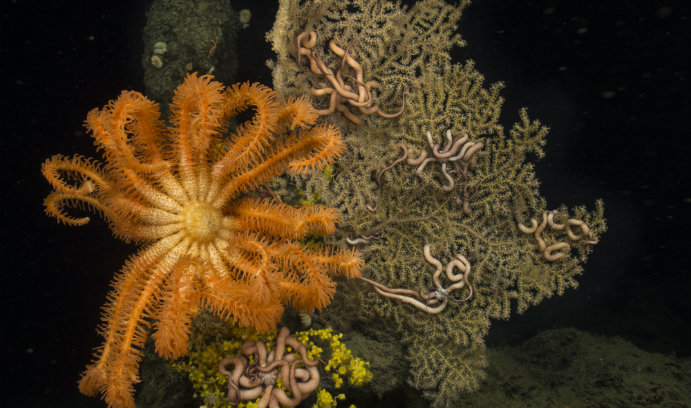A Deepwater Expedition to Study 'Jewels of the Gulf'

Deepwater coral, orange basket star and brittle stars. Photo: ECOGIG and Ocean Exploration Trust.
The 2010 Deepwater Horizon accident in the Gulf of Mexico resulted in the deaths of 11 oil rig workers and ultimately the largest marine oil spill in history. As this environmental disaster recedes into history, researchers from institutions across the U.S. continue to study its enduring ecological impacts.
One of these research teams has embarked on a 12-day expedition in the Gulf that began on June 11 to investigate the impacts of oil, methane and chemical dispersants on the deep sea ecosystem—in particular deep sea corals. Deep sea corals are ecologically important and provide vital habitat for marine life, including commercially important species such as shrimp, crab and grouper.
The scientists are part of the Ecosystem Impacts of Oil and Gas to the Gulf (ECOGIG) research consortium, one of several research consortia supported by the Gulf of Mexico Research Initiative.
The team will send a remotely operated vehicle (ROV Global Explorer) to depths of over 1,000 meters and use high-resolution cameras mounted on the ROV to capture hundreds of still images of corals they have been monitoring yearly since shortly after the spill in 2010. These photographic data will be collected and analyzed—along with images from prior expeditions—to document the spill’s impacts and improve understanding of the mechanisms that influence coral recovery and survival.
The ROV feed will be available when the ROV is diving and can be viewed live at this link.
“Continued monitoring is critical,” said project co-leader Chuck Fisher of Pennsylvania State University. “After seven years the 500-year old corals are still recovering from the effects of the spill and their ultimate fate is still not known. A lot remains to be learned about these amazing and beautiful animals.”
Lehigh University Visiting Assistant Professor in Biological Sciences, Santiago Herrera, will be among the researchers. He is collecting samples to address crucial gaps in the understanding of the processes that limit the reproduction among populations of deepwater corals in the Gulf of Mexico, including species affected by the Deepwater Horizon oil spill.
“Deepwater corals play a fundamental role in vulnerable marine ecosystems like the Gulf of Mexico by providing habitats for diverse and abundant populations of invertebrates and fishes,” said Herrera. “The goal of this research is to enhance the understanding of these ecosystems to inform resource management, as well as the basic mechanisms that shape biodiversity in the deep ocean.”
ECOGIG outreach and communication specialists aboard the ship during the “Jewels of the Gulf: Deepwater Expedition” will connect with the public in variety of ways. A live ROV camera feed will be accessible throughout the expedition at ecogig.org. School children and summer campers across the U.S. will interact with scientists onboard during live question and answer sessions, and in collaboration with Mission Blue, an interactive Facebook Live video hosted by Ocean Allison will be broadcast to a worldwide audience from the Gulf of Mexico.
Anyone can stay up to date on the research in real time by following along via ECOGIG’s Facebook, Twitter, and Instagram channels.
Additional content including educational videos, podcasts and a documentary short film will become available after the expedition.
The 15-institution ECOGIG consortium is led by project director Samantha Joye of the University of Georgia. Institutions participating in this expedition include Pennsylvania State University, Temple University, Lehigh University, University of Georgia and the U.S. Geological Survey.
Posted on:




